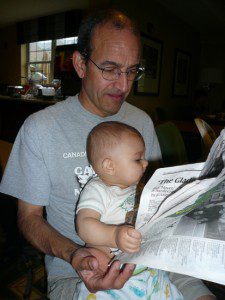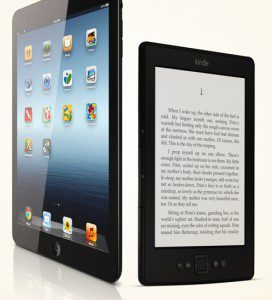
They always surprise me with their unique requests. Last weekend, as I was writing a magazine article, one of my grandsons walked around my office pointing at books and papers and photographs while asking, “What’s this?” or “What’s that?” It went on for 20 minutes. It was great fun. But I think my favourite request was when another grandson looked at me with drooping eyelids, a big yawn and a special request on his lips.
“Would you read me a bedtime story, please?” he asked. Then, there was a short pause as I waited for the supplementary, “Can I hold the book?”
It wasn’t quite the situation to congratulate him with a slap on the back or to share a high-five. But almost. Being very much tied to the tradition of writing words for publication in newspapers, magazines and books, I can’t help but be delighted when one of my offspring tells me he prefers a hard-copy book over an e-reader, a Nintendo Wii or the video game on his mom’s smart phone. And when he also prefers to follow each line by sliding his finger across the page and actually turning the pages, I know I have nurtured another convert. Actual, tangible books – with cloth covers, stitched bindings, and carbon-smelling print on their sometimes dog-eared pages – will, via my grandchildren, survive at least one more generation.
 And if theirs is the last generation to physically hold real books, we only have ourselves to blame. Like the proverbial Trojans, we have brought the gift-bearing Greeks (or more likely the gift-bearing geeks) into our midst by putting tablets, smart phones and soon wristwatches into and onto our children’s and grandchildren’s hands.
And if theirs is the last generation to physically hold real books, we only have ourselves to blame. Like the proverbial Trojans, we have brought the gift-bearing Greeks (or more likely the gift-bearing geeks) into our midst by putting tablets, smart phones and soon wristwatches into and onto our children’s and grandchildren’s hands.
A Forbes survey of millennials (those youths reaching adulthood about the year 2000) in the U.S. says that nearly 90 per cent of them use two or three tech devices a day. Nearly half of them will buy a tablet computer this year. And nearly a third of them are into wearable communication devices. So the next time you see a twenty-something look at his wrist, don’t ask him what time it is; ask him how the murder mystery ends. Further into the future, if Google Glass decides to offer novels and non-fiction books in its hi-tech spectacles, we’re all in trouble; optical head-mounted display (OHMD) will make distracted driving via smart phones seem like a minor misdemeanour.
“There are 80 million millennials in America alone,” Forbes magazine said, “and they represent about a fourth of the entire population with about $200 billion in annual buying power.”
And speaking of buying books, who’s left? Not Britons apparently. About a year ago, the Guardian newspaper reported that the number of independent bookshops in fashionable shopping areas around Britain had slipped to fewer than 1,000; as many as 500 book stores have closed across the Isles since 2005 because of the marketing of books in supermarkets, via Amazon and ebook purchases. Even formidable, stalwart British bookseller Waterstones, said the newspaper, has shrunk from 300 to 280 outlets, principally because ebook sales grew 134 per cent between 2012 and 2014. But that’s across the pond. North American bookselling is less bleak.
In the U.S., despite the impact of the millennials I just mentioned, print books appear to be outstripping their electronic cousins. A Nielson survey published by Huffington Post indicates that ebook sales have levelled off at about 23 per cent of total sales, while hard-cover books make up 25 per cent of book buying and paperbacks about 42 per cent of purchases. Another U.S. survey group, called Pew Research, recently reported that 69 per cent of Americans were still looking to print editions when they read or bought a book; and that’s up 4 per cent. Stephen King was quoted in one of the surveys.
“I think books are going to be there for a long, long time to come,” the bestselling horror author said.
It turns out that celebrities are responsible for the burgeoning of another book form in recent years – audiobooks. For quite a while now, the notion of CDs as a means of getting your book fix has been pretty much limited to children’s entertainment on long trips in the car, or archive audio for storytelling of the historical kind.
It turns out that so-called “A-list” actors are finding additional work, not to mention attracting more booklovers, by narrating books on all manner of digital devices – Reese Witherspoon reading Go Set a Watchman, Jake Gyllenhaal reading The Great Gatsby, and Nicole Kidman reading To The Lighthouse, for example. The Toronto Star reported this week that audiobook sales generated $1.47 billion in 2014, representing more than 25,000 different titles.
I’m just hoping that I can keep my gandkids’ ears tuned to my voice reading their bedtime stories long enough before it’s time for them to snuggle up with books in bed with their kids.